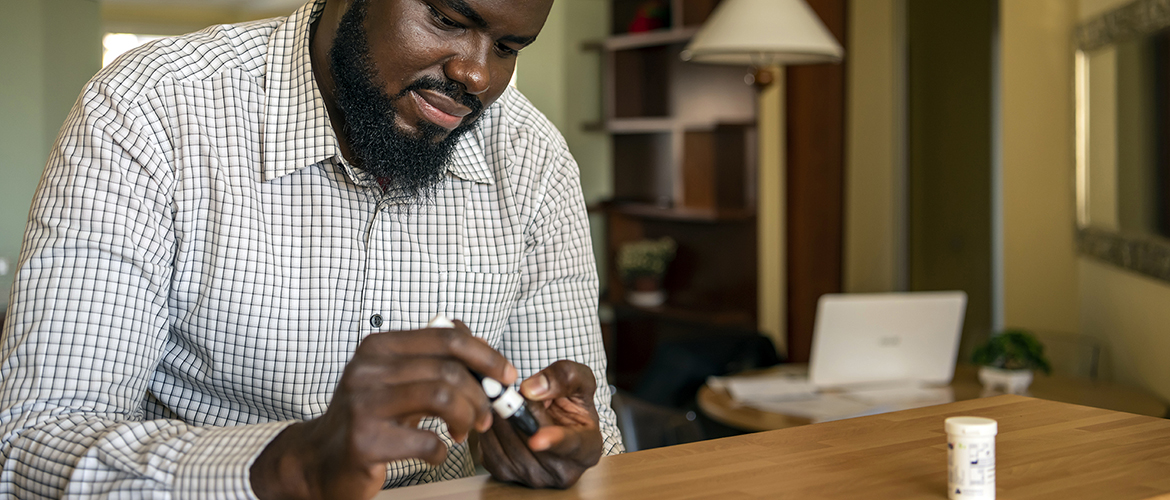Blood sugar control always is a balancing act for people with diabetes, who manage their conditions through diet, exercise, medications and monitoring.
But diabetes management has become more important than ever as mounting evidence indicates people with the condition who contract COVID-19 are at higher risk of severe illness. Yet, many people may not be getting routine lab tests because they're avoiding potential exposure to the novel coronavirus that causes COVID-19.
A home screening initiative launched by Health Care Service Corporation is targeting about 6,500 non-Medicare members in Illinois, Montana, New Mexico, Oklahoma and Texas who have gaps in their diabetes testing, putting them at greater risk of serious health complications. Free home kits to collect blood and urine samples for testing will be sent to those members to help them control their conditions without leaving home.
Qualified members already have been given the option to participate in the program.
"We’re committed to helping members access the care they need, especially during this national health emergency."
Eligible members are between 18 and 75 years old with Type 1 and Type 2 diabetes who have not had blood glucose testing, nephropathy (kidney disease) screening or both. They must identify a primary care provider to participate, who, along with the member, will receive the test results.
“Some of these members may not be following up because of COVID-19 and they are afraid to go to a lab for testing,” says Hala Ibrahim, director of enterprise quality reporting for HCSC. “Here is a safe way to do testing in the convenience of your own home.”
Additionally, those whose results indicate high blood glucose levels will receive another home hemoglobin test in six months to ensure they are on the right track, Ibrahim says.
Under a separate program, HCSC has sent kits to Medicare members with testing gaps. Of the estimated 7,200 of these eligible members who received free kits this year, roughly 16% have returned the hemoglobin A1C test for blood glucose and almost 17% returned the microalbumin test for kidney function.
The kits are intended to help members prevent serious diseases and conditions. Members who receive abnormal results and their doctors are urged to arrange follow-up testing.
“We’re committed to helping members access the care they need, especially during this national health emergency,” Ibrahim says. “Because of the COVID-19 pandemic, we want to make some in-home screening options available.”
Testing prevents serious illnesses
Nearly 27 million people in the U.S. have been diagnosed with diabetes, and an estimated 1.5 million new cases are diagnosed every year, according to the Centers for Disease Control and Prevention. Diabetes is the seventh-leading cause of death in the nation.
Uncontrolled diabetes weakens the immune system and can lead to heart disease, stroke, kidney disease, nerve damage and amputations. People with diabetes also are at higher risk of severe illness from COVID-19, the CDC says.
Nearly 40% of COVID-19 deaths have been from those with the disease, while 90% of the hospitalizations have been people with diabetes or other underlying conditions.
So, it’s important for members to ensure their conditions are under control, Ibrahim says.
With the hemoglobin A1C and nephropathy tests, blood and urine samples are provided, which are returned to a lab for analysis. The A1C test measures the percentage of hemoglobin — a protein in red blood cells that carries oxygen — coated with sugar. The higher the A1C level is, the less controlled the blood sugar is, increasing risk of diabetes complications.
The nephropathy (or microalbumin) test looks for tiny levels of a blood protein called albumin in urine. It can detect early signs of kidney damage in people at risk of developing kidney disease.
The American Diabetes Association recommends hemoglobin A1C tests every three to six months depending on diabetes treatment and level of control. Urine microalbumin tests are recommended annually to check kidney function.
Familiarity may lead to increased screening
Earlier this year, HCSC sent home kits to all eligible Medicare members to ensure they had safe screening options during the pandemic. Typically, they can opt out of receiving kits, which the insurer began offering in 2016.
So far, about 6% more members have returned kits this year than during the same period in 2019, which is a significant change, says Christine Wetzel, a divisional strategy consultant for HCSC’s Medicare quality program. The results are especially encouraging, she says, since the lab that analyzes members’ kits is processing fewer diabetes tests overall this year.
The lab suspects people with diabetes who have remained home during the pandemic may not be eating properly, Wetzel says. So, they may be reluctant to submit tests because their results probably will be elevated.
More HCSC members may be participating because they’ve become more familiar with the program after hearing about it over the past few years — and they want to protect themselves during the pandemic, says, Eric Siegmann, a manager of HCSC’s Medicare and duals quality programs.
“There are members who do it every year,” he says. “This year, with the pandemic, it makes it even more desirable to complete screening in their homes.”

